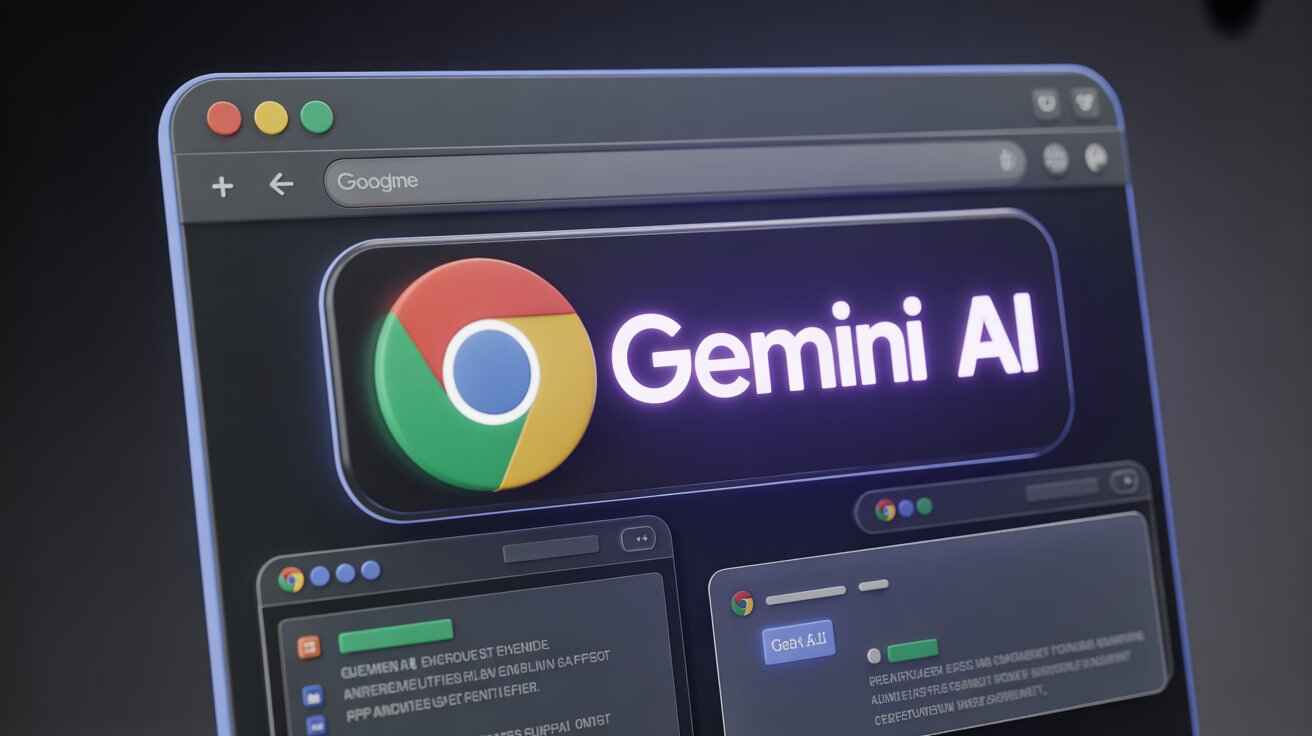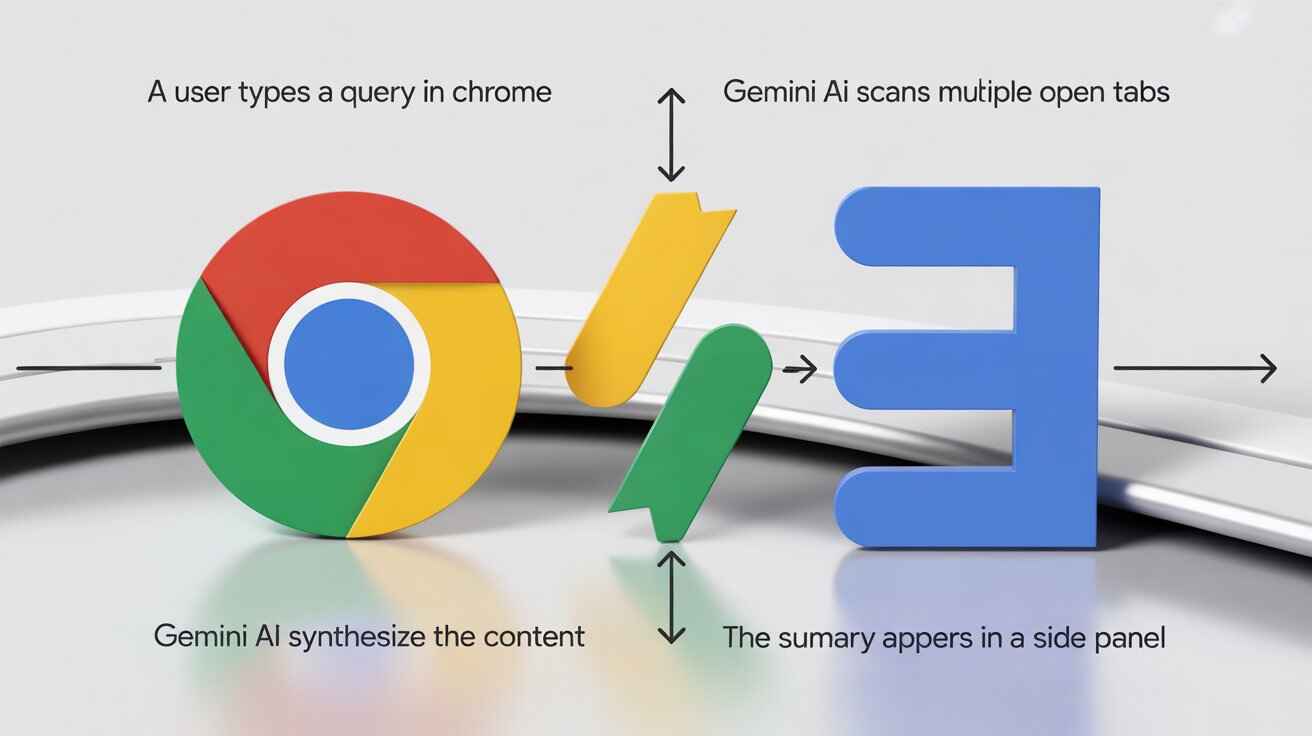Google has officially rolled out Gemini in Chrome, making AI a built-in feature of the world’s most popular browser. Starting in the U.S. on desktop, Chrome users now see a Gemini chatbot button right inside the browser. With one click, you can ask questions, get summaries, or even pull insights across all your open tabs.
This move signals a new era where browsers are no longer just windows to the web — they are becoming intelligent assistants. Soon, mobile users on Android and iOS will also get the same feature.
But what does Gemini in Chrome really mean for everyday browsing? Let’s break it down.
What Is Gemini in Chrome?
Gemini is Google’s generative AI model, built to handle text, images, and even code. By placing Gemini directly into Chrome, Google is reimagining how people interact with the internet.
Instead of opening multiple tabs and scanning pages manually, users can now:
-
Ask questions directly in the browser.
-
Summarize multiple open tabs.
-
Generate quick answers without leaving Chrome.
This integration turns Chrome into more than a browser. It becomes a personal AI companion for research, shopping, learning, or work.
How Gemini in Chrome Works
When you click the Gemini button in Chrome, you get a chatbot panel on the side. You can type or paste a query, just like using ChatGPT or Google’s Gemini website.
But here’s the difference: Gemini in Chrome has direct context from your browsing session. It can:
-
Look at your current tab.
-
Pull info across multiple tabs.
-
Provide synthesized answers with links back to sources.
For example, if you’re researching vacation spots with 10 tabs open, you can ask, “Compare these destinations by cost and weather.” Gemini will scan your tabs, extract details, and give you a summary in seconds.
This saves time and reduces the stress of tab overload.
Why Browsing Is Changing
The integration of Gemini in Chrome is more than a new feature. It reflects a shift in how we interact with the internet.
Traditionally, browsers were search-first tools. You typed a query, got results, and clicked through links. Now, Chrome itself becomes the answer engine.
Instead of browsing five different websites, you can ask Gemini directly. It’s browsing, searching, and summarizing all rolled into one.
This means the browser is no longer a passive tool — it’s an active assistant.
Benefits for Users
Adding Gemini in Chrome creates clear benefits for users:
-
Faster Research – No more reading dozens of articles. Summaries are instant.
-
Better Productivity – Gemini can draft emails, notes, or explanations while you browse.
-
Learning Support – Students can ask Gemini to explain topics from online textbooks or articles.
-
Simpler Shopping – Compare products across tabs without manual checking.
-
Accessibility – People who struggle with information overload get a cleaner, guided experience.
Benefits for Businesses and Marketers
Businesses should also pay attention. With Gemini in Chrome:
-
Content discovery changes. Instead of users clicking ten results, they may only read Gemini’s summary.
-
Brand visibility shifts. Companies need AI-optimized content to appear in Gemini responses.
-
User engagement improves. If your site offers structured, clear data, Gemini is more likely to highlight it.
For marketers, this means SEO is evolving into AIO (AI Optimization).
Privacy and Security Concerns
Of course, embedding AI directly into the browser raises questions.
-
Data Access – How much of your browsing history can Gemini see?
-
User Consent – Will Chrome make it clear when AI scans multiple tabs?
-
Trust in Summaries – Can you trust AI-generated answers over raw websites?
Google says user privacy remains a top priority, but critics warn that mixing browsing data with AI could create new risks. Transparency and opt-in features will be key.
Speed and Performance
Another factor is speed. Chrome is already known for being heavy on memory. With Gemini in Chrome, performance could become an issue.
Google claims Gemini runs efficiently, offloading most processing to cloud servers. Still, users with many tabs may notice slower performance or battery drain.
The trade-off is clear: more intelligence vs. more resource usage.
Use-Case Stories
To make it real, let’s look at a few ways people might use Gemini in Chrome.
-
Student Researching for an Essay
Instead of flipping between 12 history articles, the student clicks Gemini: “Summarize the main causes of World War I from these tabs.” They get a concise, reliable draft in seconds. -
Shopper Comparing Gadgets
Someone researching headphones opens five product pages. Gemini compares specs, reviews, and prices, then outputs a simple chart. -
Professional Writing an Email
A user browsing articles for work asks Gemini: “Summarize these three reports into an email draft for my manager.” The AI delivers a polished email instantly.
These examples show how Gemini in Chrome saves time across different fields.
The Bigger Picture: AI Browsers Go Mainstream
Gemini in Chrome is part of a larger trend. Browsers are becoming AI-first platforms.
-
Microsoft Edge already integrates Copilot.
-
Brave and Opera have AI features built in.
-
Now, Google Chrome, with its huge user base, brings Gemini to the masses.
This will accelerate the mainstream adoption of AI browsing. For many people, their first real AI experience won’t be ChatGPT or a standalone app — it will be Gemini in Chrome.
Challenges Ahead
Even with its promise, Gemini in Chrome faces challenges:
-
Accuracy – AI can make mistakes or hallucinate.
-
Trust – Users may not trust AI over raw web pages.
-
Competition – Edge, Brave, Opera, and others are innovating fast.
-
Ad Revenue – If people get answers directly in the browser, will they click ads less often?
These hurdles will shape how successful Gemini becomes.
The Future of Browsing
So, what’s next?
In the near future, browsing may look less like clicking links and more like having a conversation with your browser.
Imagine asking Chrome:
-
“Find me the cheapest flights for next month.”
-
“Summarize today’s AI news in five points.”
-
“Show me three recipes based on the ingredients in my fridge.”
This future is already beginning with Gemini in Chrome.
Also Read
ChatGPT vs Claude vs Gemini – Which Is the Best AI Assistant
Google’s Gemini for Home Is Here – Say Goodbye to Google Assistant
Conclusion
The launch of Gemini in Chrome marks a turning point in web browsing. Chrome is no longer just a search tool — it’s becoming a personal AI assistant.
For users, this means speed, simplicity, and smarter browsing. For businesses, it means adapting content strategies for AI-driven discovery.
As Gemini expands to mobile and global markets, one thing is clear: the browser of the future is not just where you search — it’s where AI thinks with you.


